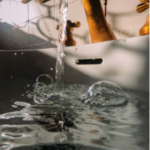
Can a plunger unclog a sink? Many homeowners wonder if a simple plunger can do the trick, or if they need to explore other options. In this blog, we’ll discuss the effectiveness of plungers for unclogging sinks, explore the types of sinks that respond well to plunging, and provide some tips for effective plunging techniques.
Understanding Sink Clogs
Sink clogs can occur for various reasons, including:
- Accumulation of Debris – Over time, sinks can accumulate hair, soap scum, food particles, and other debris, leading to clogs in the drain.
- Grease Buildup – Kitchen sinks are particularly prone to grease buildup, which can congeal and block the drain.
- Mineral Deposits – Hard water can leave mineral deposits in sink drains, contributing to clogs over time.
Which Sinks Can Be Unclogged with a Plunger?
Plungers can be effective for unclogging certain types of sinks, including:
- Kitchen Sinks – Plungers can often dislodge clogs caused by food particles, grease, and other debris in kitchen sink drains.
- Bathroom Sinks – Plungers can also be effective for unclogging bathroom sinks, especially those clogged with hair, soap scum, or toothpaste residue.
- Utility Sinks – Utility sinks, typically found in laundry rooms or basements, can also respond well to plunging for common clogs.
Sinks That May Not Respond Well to Plunging
While plungers can be useful for many sink clogs, there are instances where they may not be appropriate, such as:
- Double Basin Sinks – Plungers may not work effectively in double basin sinks if the clog is located in the shared drainpipe between the two basins.
- Severe Clogs – If the clog is particularly stubborn or severe, plunging alone may not be sufficient to clear it.
Tips for Effective Plunging
- Create a Seal – Ensure that the plunger forms a tight seal around the drain opening to maximize suction.
- Use Quick, Firm Movements – Apply quick, firm thrusts with the plunger to create pressure and dislodge the clog.
- Repeat as Needed – If the clog doesn’t clear immediately, repeat the plunging process several times before reassessing.
- Avoid Harsh Chemicals – Instead of resorting to harsh chemical drain cleaners, which can damage pipes and harm the environment, opt for plunging as a safer alternative.
When to Call SBPHA/C
If you’ve tried plunging and other DIY methods without success, or if you’re dealing with a persistent or severe sink clog, it’s time to consider the professionals at Solution Based Plumbing Heating and Cooling (SBPHA/C). Don’t hesitate to contact us for expert help. Our skilled technicians have the expertise and tools to tackle even the toughest sink clogs, restoring proper drainage to your sink in no time.
